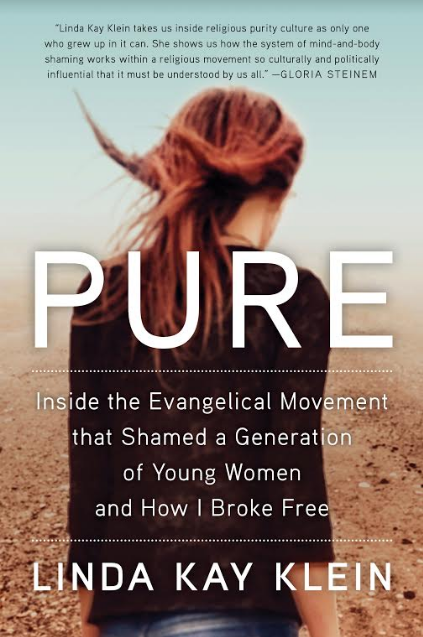|
The Breadcrumbs widget will appear here on the published site.
Pure and the Mission to Change the WordThe value of a woman’s chastity has long been used to determine her worth, but the 1990’s brought a unique and insidious form of sexual shaming to a new generation of women: purity culture. Though other essays and books have touched on purity culture’s destructive legacy, none have reached such a painfully relatable level for thousands of women around the United States. Pure is a stunningly unique combination of investigative journalism, interviews, and a memoir of the effects of purity culture on an entire generation of church-goers, particularly young women attending Evangelical churches across the United States. The book 12 years in the making is written by author and activist Linda Kay Klein and has been praised by feminist and religious leaders alike for its thorough investigation and testament against the purity movement. The book opens with an introduction to Klein’s early life as a blossoming young woman aspiring to be a missionary. But while her future seemed to be dedicated to spreading the love of God she had always known, it also meant facing that the same love came with a binding contract of keeping any hint of sexuality on lock. The comparison widely used by purity culture to justify the control of female appearance and behavior is a “stumbling block”, or the implication that young girls are solely responsible for the sexual reactions of young boys and men.Klein explores how deeply this opens up every woman to blame for the unacceptable, yet not often held accountable behaviors from men such as ogling, cat-calling, and assault. As another result, people put in power at church are given free passes to objectify and abuse other church members under the presumably safe environment of a worship experience.
And yet, the abuse is still very much insidious and complex. Many church members, both current and former, can recall or still experience very fond memories growing up in the church. Though many outside of a church setting can easily demonize the movement as an obvious danger to the mental and physical well-being of young women, Klein’s direct experience as a dedicated follower of Christ and a first-hand witness of the impact it made on her community and beyond guides her to an empathetic -but honest - critique. Klein openly discusses her conflicting feelings with the good intentions of the purity movement - such as reactions from family and old friends, her former church community, etc. - while also facing the devastating emotional and physical impact that it has had on romantic relationships and marriages, such as intense intimacy problems and PTSD-like symptoms. Klein also rebukes the church’s idea of “suffering” as a level of one’s dedication towards Christ by citing her own diagnosis with Crohn’s disease. In her writing, she bravely and assertively pushes against the movement that has clouded the messages that are intended to uplift marginalized people instead of pushing them further beneath the shadow of society. The book also gives an important disclaimer that Klein’s experiences, as well as the experiences of most of the interviewees in the book, are from the perspectives of white women. From the very beginning, she acknowledges the limited viewpoint her book presents by not being about to explore the experiences of people of color and further encourages the dialogue to be continued by the voices who best represent it. Instead of attempting to represent all marginalized sectors of the church community, Klein rightfully passes the dialogue on to the people who experience it first hand. While many books preach - pun intended - about the importance of reform and change when it comes to socially-ingrained behaviors, not many follow through with their promises. They may even provide half-hearted solutions or no solutions at all. Klein takes the opportunity to give her readers the chance to dive further into resources, including other books about the same topic or organizations dedicated to healing. Klein also founded the Break Free Together initiative uniting people from backgrounds of sexual shaming to break away from the ideas that limited their life experiences and to overcome it. Overall, the book builds an essential bridge between traditionally divided progressive ideas and religious thought. It is also the invitation for many women who have been victims of the movement to finally come together to heal. Pure is available now from Touchstone. CommentsComments are closed.
|
|








